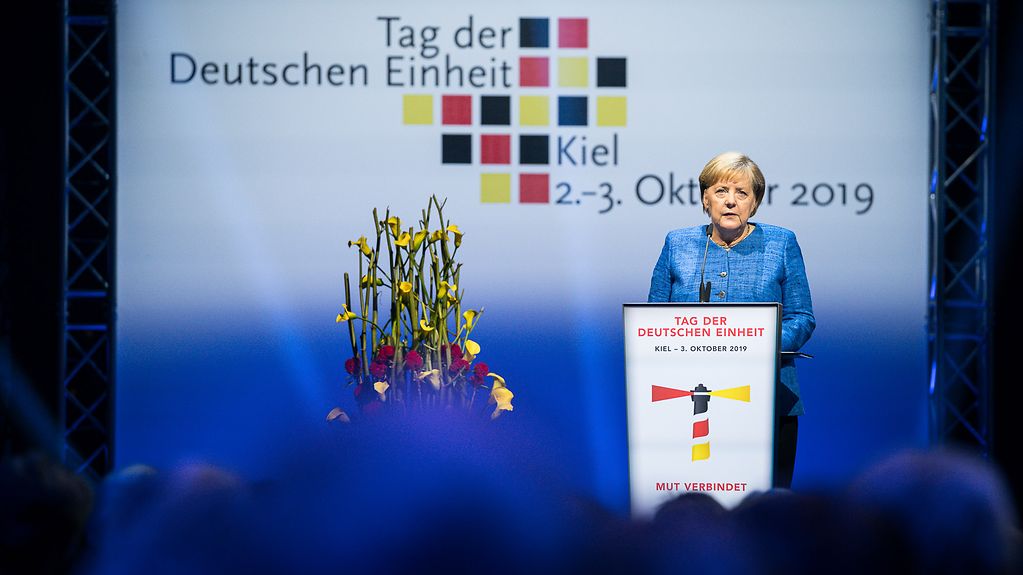Ceremony to mark the Day of German Unity
Since 1990 "an incredible amount has been achieved", declared Chancellor Angela Merkel at the ceremony to mark the Day of German Unity. Yet, it must be noted that the majority of people in the east of the country still feel that they are "second class citizens". Policy-makers and civil society must learn to understand that, for very many people, reunification "has not been a purely positive experience".
4 min reading time

German reunification is a process that we have to keep working at, stressed the Chancellor during the ceremony in Kiel
Photo: Bundesregierung/Kugler
"For me, German reunification began with a culture shock, " reported Chancellor Angela Merkel in her speech at the ceremony in Kiel to mark the Day of German Unity. All the preparations had been made when she too set off for the celebrations on 3 October 1990 in Berlin’s Philharmonie. "Everybody was in high spirits. But suddenly my joy gave way to concern, something like trepidation." Why? It was the police officers. One day earlier they had still served as GDR Volkspolizei officers. Overnight they had donned West Berlin uniforms. But had anybody really considered the fact that "the way people think and feel, the way they perceive and experience things cannot just be left in the cloakroom, and that they perhaps don’t even want to change?" asked Angela Merkel in her speech.
Reunification is not a status quo, it is something we have to keep working at
For her and for many others the fall of the Berlin Wall and reunification were "moments of sheer joy, of confidence, of openness in the widest possible sense". But others were anxious, since the GDR had been a structure that gave them support and certainty.
Although reunification has been finalised at government level, she said, the Germans have not yet been reunified, in the sense of forging a unified identity. "German reunification is not a status quo. It is not something that we do once and then it is over. It is an ongoing process. It is something we have to keep working at. It is a process that affects all Germans no matter what federal state they live in," said the Chancellor.
3 October is a date that invites us to look back at the historical achievements of statesmen like Willy Brandt, Helmut Kohl and Hans-Dietrich Genscher. And it is an invitation to come to a common understanding about the future.
No individual liberty without individual responsibility
The commemoration of the peaceful revolution in the GDR is a reason to think very closely about the relationship today between the people and the state. Since the GDR did not allow its people to decide on the important aspects of their lives independently, the state was "practically the perfect excuse for our own inadequacies". Even today, she continued, we can see that some people in the East, and in the West, are quick to seek the causes of difficulties "firstly and primarily at the door of the state and what they term the elite".
This sort of thinking, however, leads us down the wrong path – because we, all of us, are the liberal democratic state. Individual liberty "can never be had without individual responsibility", warned Angela Merkel. In 1990, it could only be guessed that assumption of responsibility is also "part of the hard work of liberty" and that this "is the heart of democracy".
Ensuring comparable living conditions and fair participation
Germany today is no longer the country it was in 1990. The East and the West have moved closer together, said Angela Merkel. But living conditions are still not identical, particularly but not only between the former GDR and the former Federal Republic. Policy-makers have the responsibility to enable everybody in Germany to live in liberty. This presupposes putting in place comparable living conditions, fair opportunities to participate and good development opportunities at local level.
"No common ground without compromise"
In a vibrant democracy it is essential to discuss the major challenges facing us "in an open, and lively debate, in which all divergent opinions can be voiced" – in line with the rules of play laid out in the German Basic Law or constitution. This means, "embracing free discussion and admitting difficult demands" – but it also means "rejecting intolerance, rejecting marginalisation, rejecting hatred and rejecting anti-Semitism," stressed the Chancellor.
For a good future it is crucial to discuss fears and concerns in an atmosphere of mutual respect, and all sides must be willing to compromise. "Without compromise there is no common ground. And that is what today is all about – common ground, unity, and law and liberty in our country."
It is important to pay attention to one another, to listen to one another, to learn from our different experiences, so that "we can use our imaginations to build our common future". That is why it is appropriate to celebrate German Unity with a lively party and to rejoice in the "diversity our country has to offer".